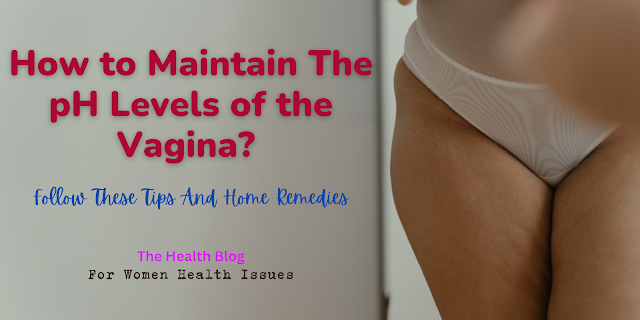Maintaining the pH Levels of the Vagina: 12 Tips and 4 Home Remedies
The pH levels of the vagina are crucial to maintaining vaginal health. The vagina is naturally slightly acidic, with a pH level between 3.8 and 4.5. This acidic environment helps to keep harmful bacteria and fungi in check and prevents infections.
Courtesy: Canva
However, various factors such as menstrual periods, douching, and sexual activity can disrupt the pH balance of the vagina, leading to an increased risk of infection. In this article, we will discuss tips and home remedies to help maintain the pH levels of the vagina.
1. Avoid Douching
Douching is the process of washing the inside of the vagina with water or other fluids. While some people believe that douching can help maintain vaginal hygiene, it can actually disrupt the natural pH balance of the vagina and lead to infections. According to the American College of Obstetricians and Gynecologists (ACOG), douching can increase the risk of bacterial vaginosis (BV), pelvic inflammatory disease (PID), and sexually transmitted infections (STIs). Instead of douching, allow your vagina to naturally clean itself.
Also Read: Top 20 Questions About Your Period You're Embarrassed to Ask
2. Use a pH-Balanced Soap
Using a pH-balanced soap is essential to maintain the natural pH balance of the vagina. Regular soap can disrupt the acidic environment of the vagina and increase pH levels. It is essential to choose a soap that is specifically formulated for vaginal use and has a pH balance between 3.8 and 4.5. Using a pH-balanced soap can help prevent infections and maintain vaginal health.
Also Read: How To Revive Your Relationships
3. Wear Breathable Clothing
Wearing tight clothing and synthetic fabrics can trap moisture and heat, leading to an increase in pH levels. Opt for loose, breathable clothing made of natural fibers like cotton. Wearing breathable clothing can help prevent infections and maintain vaginal health.
4. Practice Safe Sex
Sexual activity can introduce new bacteria into the vagina, which can disrupt the pH balance. It is crucial to practice safe sex to reduce the risk of infections. Using a barrier method of contraception, such as condoms, can help prevent STIs and maintain vaginal health.
Courtesy: Canva
5. Avoid Scented Products
Scented products like soaps, tampons, and pads can disrupt the pH balance of the vagina. These products contain chemicals that can irritate the sensitive skin of the vagina and increase pH levels. Opt for unscented products instead. Using unscented products can help prevent infections and maintain vaginal health.
6. Stay Hydrated
Drinking plenty of water is essential to maintaining a healthy pH balance in the body. Water helps to flush out toxins from the body and maintain a healthy pH balance. It is recommended to drink at least eight glasses of water a day to maintain optimal hydration levels.
A diet rich in fruits, vegetables, and probiotics can help maintain a healthy pH balance in the vagina. Probiotics are beneficial bacteria that can help prevent infections and maintain vaginal health. Eating a diet rich in probiotics can help maintain a healthy pH balance in the vagina.
8. Practice Good Hygiene
Maintaining good hygiene is crucial to prevent infections and maintain vaginal health. Always wipe from front to back after using the bathroom to prevent the sprad of bacteria. Avoid using scented products and harsh chemicals on or near the vagina, as they can irritate the sensitive skin and disrupt the natural pH balance.
9. Keep the Vagina Moisturezed
Maintaining vaginal moisture is essential to prevent dryness and maintain vaginal health. Using a water-based lubricant during sexual activity can help prevent friction and maintain moisture levels. Drinking plenty of water and consuming foods high in water content, like fruts and vegetables, can also help maintain moisture levels in the body.
10. Get Regular Gynecological Exams
Getting regular gynecological exams is essential to maintain vaginal health. These exams can help and treat infections, abnormalities, and other health issues before they become more severe. It is recommended to get a gynecological exam at least once a year, or more often if you have a history of vaginal or reproductive health issues.
11. Manage Stress Levels
Stress can disrupt the natural pH balance of the body, leading to an increased risk of infections. Practicing stress-reducing techniques like yoga, meditation, or deep breathing exercises can help maintain a healthy pH balance in the body and prevent infections.
Probiotic with Strains to Support Digestive, Immune & Vaginal Health*, Culturelle Women’s Healthy Balance Probiotic, Gluten Dairy & Soy Free, 30 Count
Click Here For Best Vaginal Health Products
12. Avoid Chemical Irritants
Chemical irritants like harsh soaps, bubble bats, and scented products can irritate the sensitive skin of the vagina and disrupt the natural pH balance. Avoid using these products near the vagina and opt for gentle, fragrance-free options instead.
Home Remedies to Maintain the pH Levels of the Vagina
In addition to the above tips, there are various home remedies that can help maintain the pH levels of the vagina.
1. Apple Cider Vinegar
Apple cider vinegar has antibacterial properties that can help maintain a healthy pH balance in the vagina. Mix 1-2 tablespoons of apple cider vinegar with a cup of water and use it to rinse your vagina once a week. Using apple cider vinegar can help prevent infections and maintain vaginal health.
2. Yogurt
Yogurt contains beneficial bacteria that can help maintain a healthy pH balance in the vagina. Eating yogurt or applying it topically to the vagina can help prevent infections and maintain vaginal health. To use yogurt topically, apply a tablespoon of plain yogurt to the outside of the vagina and leave it on for 30 minutes before rinsing off with warm water. Repeat this process once a week.
3. Tea Tree Oil
Tea tree oil has antibacterial and antifungal properties that can help maintain a healthy pH balance in the vagina. Mix a few drops of tea tree oil with a carrier oil like coconut oil and apply it to the outside of the vagina. Leave it on for 30 minutes before rinsing off with warm water. Repeat this process once a week.
4. Baking Soda
Baking soda has alkaline properties that can help neutralize the acidic environment of the vagina. Mix 1-2 tablespoons of baking soda with a cup of water and use it to rinse your vagina once a week. Using baking soda can help prevent infections and maintain vaginal health.
Conclusion
Maintaining the pH levels of the vagina is essential to prevent infections and maintain vaginal health. Following the above tips like avoiding douching, using a pH-balanced soap, wearing breathable clothing, practicing safe sex, avoiding scented products, staying hydrated, and eating a balanced diet can help maintain a healthy pH balance in the vagina.
Additionally, home remedies like apple cider vinegar, yogurt, tea tree oil, and baking soda can also help maintain vaginal pH levels. If you experience any unusual symptoms like itching, discharge, or odor, consult a healthcare provider for proper diagnosis and treatment.
Frequently asked questions
Why is it important to maintain the pH levels of the vagina?
The pH levels of the vagina play a crucial role in maintaining its overall health. A healthy vagina is naturally acidic, with a pH level between 3.5 and 4.5. This acidic environment helps to keep harmful bacteria and fungi at bay, reducing the risk of infections and other health issues.
How can I test my vaginal pH level at home?
There are pH testing kits available in drug stores that can help you test your vaginal pH level at home. However, if you are experiencing any symptoms of vaginal infection or discomfort, it is best to consult a healthcare provider for proper diagnosis and treatment.
What are some factors that can affect vaginal pH levels?
Several factors can affect vaginal pH levels, including menstrual cycle, sexual activity, use of antibiotics or other medications, hormonal changes, and certain hygiene practices such as douching.
How can I maintain a healthy vaginal pH level?
To maintain a healthy vaginal pH level, it is important to practice good hygiene habits such as washing the vulva with mild soap and water and wearing cotton underwear. Avoid using scented products and douching, which can disrupt the natural balance of the vagina. Eating a healthy diet rich in probiotics may also help promote a healthy vaginal pH.
What are some signs of an unhealthy vaginal pH level?
Some signs of an unhealthy vaginal pH level include unusual vaginal discharge, itching or burning sensations, strong odors, and discomfort during sex or urination. If you experience any of these symptoms, it is important to consult a healthcare provider for proper diagnosis and treatment.
Can certain foods or drinks affect vaginal pH levels?
Yes, certain foods and drinks can affect vaginal pH levels. Consuming too much sugar, for example, can promote the growth of harmful bacteria and yeast in the vagina. On the other hand, foods rich in probiotics, such as yogurt and kefir, may help promote a healthy vaginal pH.
How can I prevent recurring vaginal pH imbalances?
To prevent recurring vaginal pH imbalances, it is important to maintain good hygiene practices and avoid using harsh products or practices that can disrupt the natural balance of the vagina.
Additionally, avoiding tight-fitting clothing and using condoms during sexual activity may help reduce the risk of vaginal pH imbalances. If you experience recurring imbalances, it is important to consult a healthcare provider for proper diagnosis and treatment.















0 Comments